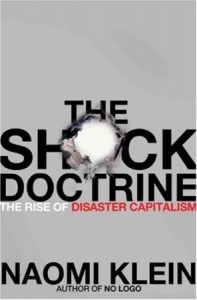
Mark LaFlaur at
Levees Not War.
“Disaster Capitalism Will Solve U.S. Budget Deficit?
Ask New Orleans and Wisconsin.”
7/6/11
 David in our Berkeley bureau, whose last dispatch was about global warming and extreme weather (May 24), observes that the G.O.P. hard-liners insisting on reducing the deficit only by cutting Medicare and privatizing other “common good” safety net programs are simply employing the same old deadly “disaster capitalism” techniques that were revealed by Naomi Klein in her powerful 2007 book The Shock Doctrine:
David in our Berkeley bureau, whose last dispatch was about global warming and extreme weather (May 24), observes that the G.O.P. hard-liners insisting on reducing the deficit only by cutting Medicare and privatizing other “common good” safety net programs are simply employing the same old deadly “disaster capitalism” techniques that were revealed by Naomi Klein in her powerful 2007 book The Shock Doctrine:
Truly, an insane situation, but not without precedent. I’ve been rereading Naomi Klein’s book The Shock Doctrine, and this is pure simple disaster capitalism following the template: use the bludgeon of national debt to create a crisis, erase progressive history and shred the social safety net, then firebomb the populace with austerity to remake the world for elites and the investor class. It’s quite extraordinary how out in the open this is, but how little it’s talked about. That’s what Obama and the Democrats should be trumpeting about the right wing extremists, who must be taking huge amounts of hidden money from people like the Kochs and FreedomWorks, Rove’s machines, Rupert Murdoch of Fox News, and other sources (and who knows what other hidden promises have been made to them to make even previously reasonable people turn 180 on their own positions). But of course, the Dems wouldn’t utter these words because of their timidity about being called “liberal” or inciting “class war.”
The shock doctrine can be summarized as the deliberate exploitation of the public’s disorientation after a crisis (natural disaster, political upheaval, or economic turmoil) to push through free-market economic shock therapy disguised as “reforms.” The traumatized public is too concerned with basic survival to notice what “the authorities” are doing.
Naomi Klein traced the shock doctrine’s use by U.S. conservative economic advisers and policymakers — always closely linked to profit-ready corporate interests — from the U.S.-supported coup that overthrew Argentina’s Salvador Allende in 1973 to the (Iraq) Coalition Provisional Authority’s efforts to “corporatize and privatize state-owned enterprises” after the U.S. invasion in 2003 to the privatization of formerly public institutions of housing and health care in New Orleans after Hurricane Katrina in 2005 (among a dozen or more other grim “success stories”).
The shock doctrine is alive and well in the U.S.A. Paul Krugman pointed out in February that Wisconsin governor Scott Walker was using shock doctrine methods in stripping away labor unions’ collective bargaining rights in the name of fiscal discipline. Now, when Walker took office on Jan. 3, Wisconsin had no budget crisis. But there was a big deficit after his first legislative priority as governor: giving Wisconsin corporations some $140 million in tax breaks.
What’s happening in Wisconsin is . . . a power grab — an attempt to exploit the fiscal crisis to destroy the last major counterweight to the political power of corporations and the wealthy. And the power grab goes beyond union-busting. The bill in question is 144 pages long, and there are some extraordinary things hidden deep inside.
Shock Therapy by Flood, Eviction and Taser
 Most odious to us is the shock doctrine’s use after Hurricane Katrina with the demolition of undamaged, structurally sound housing projects in New Orleans and the shifting of the city’s over-stressed, under-funded public school system to a charter schools model, though as usual without adequate funding. The demolition of the New Orleans housing projects, at a time when displaced, returning residents could least afford the rising rents and housing prices, was an acceleration of a scheme long planned by the U.S. Department of Housing and Urban Development. (See “Homeless for the Holidays: Who Would Jesus Evict?”) It has been alleged, quite credibly, that the destruction of the housing projects was part of a deliberate policy to shift the city’s population back toward a whiter complexion. As Naomi Klein wrote in “Shock and Tasers in New Orleans” at the time of the evictions and demolitions:
Most odious to us is the shock doctrine’s use after Hurricane Katrina with the demolition of undamaged, structurally sound housing projects in New Orleans and the shifting of the city’s over-stressed, under-funded public school system to a charter schools model, though as usual without adequate funding. The demolition of the New Orleans housing projects, at a time when displaced, returning residents could least afford the rising rents and housing prices, was an acceleration of a scheme long planned by the U.S. Department of Housing and Urban Development. (See “Homeless for the Holidays: Who Would Jesus Evict?”) It has been alleged, quite credibly, that the destruction of the housing projects was part of a deliberate policy to shift the city’s population back toward a whiter complexion. As Naomi Klein wrote in “Shock and Tasers in New Orleans” at the time of the evictions and demolitions:
Readers of my book The Shock Doctrine know that one of the most shameless examples of disaster capitalism has been the attempt to exploit the disastrous flooding of New Orleans to close down that city’s public housing projects, some of the only affordable units in the city. Most of the buildings sustained minimal flood damage, but they happen to occupy valuable land that make for perfect condo developments and hotels.
The final showdown over New Orleans public housing is playing out in dramatic fashion right now. The conflict is a classic example of the ‘triple shock’ formula at the core of the doctrine.
First came the shock of the original disaster: the flood and the traumatic evacuation. Next came the ‘economic shock therapy’: using the window of opportunity opened up by the first shock to push through a rapid-fire attack on the city’s public services and spaces, most notably its homes, schools and hospitals.
Now we see that as residents of New Orleans try to resist these attacks, they are being met with a third shock: the shock of the police baton and the Taser gun, used on the bodies of protestors outside New Orleans City Hall yesterday [12/21/07].
Perhaps the most notorious and lethal application of disaster capitalism in New Orleans has been the closure of Charity Hospital, which was only superficially damaged by the storm (the basement flooded), so that LSU could build a new Medical Center complex several blocks from the still sturdy mid-1930s building on Tulane Avenue. Charity was long the central trauma unit in the city and the surrounding area. For watchers of HBO’s excellent series Treme, set in post-Katrina New Orleans, disaster capitalism is embodied by the opportunistic characters Nelson Hidalgo, a carpetbagger from Dallas, and C. J. Ligouri, a native New Orleanian who helps guide Hidalgo through the city’s byzantine business and political relationships. See the sharp and spicy comments at the Back of Town blog to which (we’re happy to disclose) quite a few of our friends contribute.
Don’t Taze Us, Bro’
Methods that worked pretty well for corporate interests after Hurricane Katrina and are going according to plan for Koch Industries in Wisconsin are likely to be used — why wouldn’t they? — in the Republicans’ present efforts to trim the federal budget deficit to which they contributed with such dependable regularity through the George W. Bush years — and surely still would if a Republican were in the White House. But they need not succeed. Will we let them? Will Obama and the Democrats yield?
Please join us in using the White House and Congress contact info here to press Obama and Democratic leaders to not “go bipartisan” — that approach equals capitulation and has failed entirely — but defend the social safety net. No Medicare cuts. No privatization. Cut all oil subsidies and all tax deductions or credits for corporations before even thinking about curtailing Medicare or Social Security benefits. (ExxonMobil makes $5 million in profit every single hour, yet according to Forbes it effectively pays no corporate income tax to the U.S. Treasury.) Instead, really, Medicare eligibility should be lowered to 55. That was Radical Joe Lieberman’s idea in his 2006 campaign and in 2009 during health care reform talks. (See video here.)
“My proposals were to basically expand the existing successful public health insurance programs Medicare and Medicaid. . . . When it came to Medicare I was very focused on a group — post 50, maybe more like post 55. People who have retired early, or unfortunately have been laid off early, . . .”
Let’s give that idea some Joementum.
For more on the budget deficit negotiations between the White House and Congress, Democrats and Republicans, see our detailed coverage in last week’s post “They Need to Do Their Job” and at the well-documented “10 Inconvenient Truths About the Debt Ceiling” compiled by Crooks and Liars.
“Eternal Vigilance Is the Price of Liberty”
Let us conclude with a quotation we cited when we last wrote about the shock doctrine in Wisconsin in February. This line is often used by conservatives, often by those who advocate a strong military. We, focusing on its anti-slavery origins, see the meaning differently:
Eternal vigilance is the price of liberty — power is ever stealing from the many to the few. . . . The hand entrusted with power becomes . . . the necessary enemy of the people. Only by continual oversight can the democrat in office be prevented from hardening into a despot: only by unintermitted Agitation can a people be kept sufficiently awake to principle not to let liberty be smothered in material prosperity.
— Wendell Phillips (1811�84), speech in Boston before the Massachusetts Anti-Slavery Society, Jan. 28, 1852
Notes
- Readers may also be interested in the related posts “‘Shock Doctrine’ in Wisconsin” (2/28/11) and “Tyranny Disguised as Fiscal Discipline” (3/13/11). — Author’s note.
Source
LaFlaur, Mark. “Disaster Capitalism Will Solve U.S. Budget Deficit? Ask New Orleans and Wisconsin.” Web log post. Levees Not War. 6 July 2011. Web. 11 Apr. 2014. <http:// www. leveesnotwar. org/ disaster-capitalism-will-solve-u-s-budget-deficit-ask-new-orleans-and-wisconsin/>. Used by permission.

